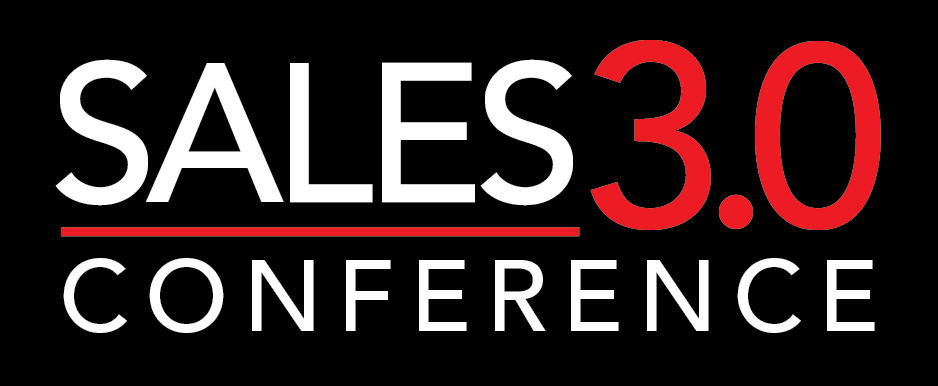Let’s be honest: Your sales team has access to more resources than ever before. Yet if I asked you right now how confident you feel about your reps walking into a high-stakes negotiation or handling a tough objection on the spot, you’d probably hesitate.
You’re not alone. Recent findings from the 2025 Copient.ai Sales Training Survey conducted in conjunction with the 2025 Sales 3.0 Conference reveal that most sales leaders are stuck in that same uncomfortable middle ground: somewhere between “we’re doing okay” and “I wish I felt better about this.”
The Gap Between Training and Readiness
Here’s what we’ve learned: More than half of sales leaders (53.3%) rate their team’s readiness as only “moderate.” Another 16.7% say it’s worse than that. And here’s the kicker: It’s not because teams lack training materials. It’s because they lack meaningful, consistent practice.
Think about how most reps actually develop their skills. According to the survey, 66.7% of organizations still rely on live customer calls as the main practice ground. Another 36.7% use peer role-plays, when they can coordinate schedules. And only 33.3% practice sales conversations as a part of onboarding.
In other words, your reps are learning on the job – with real customers, real deals, and real consequences. That’s not a training strategy. That’s a risk.
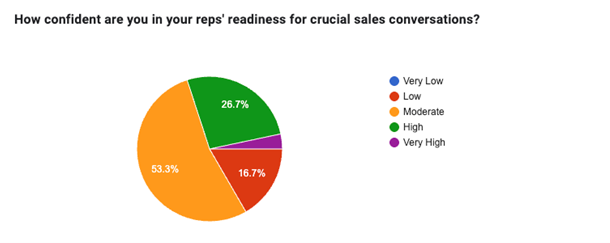
What’s Really Blocking Practice at Scale
When sales leaders were asked what prevents them from scaling practice effectively, the answers weren’t surprising, but they were telling:
- Manager time and inconsistent standards tied as the biggest bottlenecks, at 40% each
- Rep adoption and creating realistic scenarios followed, at 36.7%
This is the reality of traditional coaching: It breaks down when it depends entirely on busy managers finding time for one-on-ones or subjective feedback from role-plays that vary wildly in quality and rigor.
Without structure, practice becomes optional. Without consistency, it becomes unreliable.
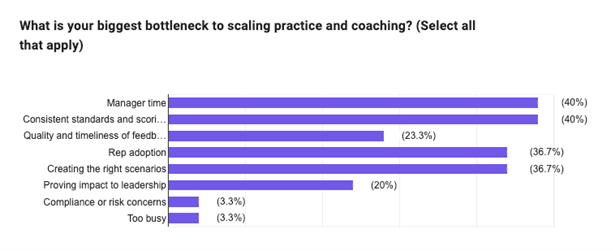
The Skills That Matter Most Are the Least Practiced
Even among teams reporting higher readiness levels, only 3.3% of leaders describe themselves as “very confident” that their reps are truly prepared for critical conversations.
And which skills are suffering most? Not product knowledge or compliance. Leaders confirm that the gaps are in the conversations that actually close deals:
- Objection handling (56.7%)
- Competitive differentiation (56.7%)
- Discovery and qualification (50%)
- Pricing and negotiation (40%)
These are the crucial moments that determine whether you win or lose the deal. And they’re the ones your team is practicing the least.
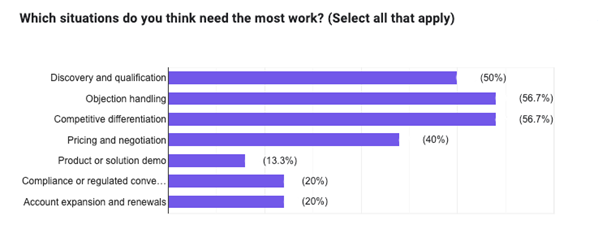
You Have Visibility – But Do You Have Performance?
Your tech stack is probably solid. Salesforce, HubSpot, Gong, Salesloft, and others are well adopted. You’ve clearly got tools that show you what’s happening in your deals. You can see the calls, review the emails, track the pipeline.
But visibility isn’t the same as readiness. You might know what happened on that customer call, but do you know if your rep was truly prepared for it? Do you know if they’ll handle it better next time?
That’s the gap most sales organizations are living with right now and trying to solve in 2026.
AI Role-Play Training Is Here, and Adoption Is Ramping Fast
AI is transforming prospecting, forecasting, and deal intelligence. But when it comes to AI training and practice, adoption is more cautious. Only 13.3% report having adopted AI role-play. However, we expect that to change in 2026 based on leaders’ response to where their company sits on the Technology Adoption Life Cycle curve:
- 10% Innovators
- 30% Early Adopters
- 20% Early Majority
- 16.7% Late Majority
- 23.3% Laggards
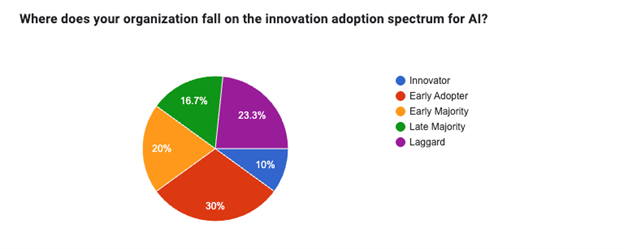
More telling is that 66.7% report either actively exploring AI role-play training or planning to explore it in 2026.
Here’s the reality: This is starting to look a lot like CRM adoption in the early 2000s. The early movers gained efficiency and competitive advantage. The late movers spent years playing catch-up.
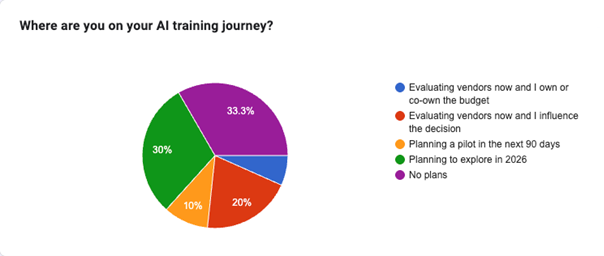
From Coaching to Calibration
Here’s what makes AI role-play training a gamechanger: It doesn’t replace your managers. It scales them.
Instead of relying on a manager to squeeze in a role-play between meetings, AI-powered simulations are on demand and can provide standardized scoring, consistent feedback, and unlimited repetition. Your reps can practice objection handling at 9:00 p.m. on a Tuesday. They can run through competitive positioning scenarios until they’ve actually internalized the message.
This shifts the manager’s role from “find time to coach” to “review data and calibrate.” You get measurable skill development. Your reps get real-time feedback. And your managers get their time back to focus on strategic coaching, not basic skill reinforcement.
The bottlenecks the survey identified – standardization and feedback loops – are exactly what AI role-play training is built to solve.
What Winning Will Look Like in 2026
The survey makes one thing abundantly clear: Readiness is becoming the new performance metric. Training can’t stop at onboarding anymore. You need systems that reinforce skills continuously and capture improvement over time.
The sales organizations that will win in 2026 are the ones that:
- Treat sales practice as strategic, not as a checkbox during onboarding
- Adopt AI-driven simulations to scale coaching consistently across the team
- Use data-backed scoring to drive real confidence and accountability
One sales enablement leader in the survey said it perfectly: “We don’t need more training content. We need more practice that actually sticks.”
That’s where this is headed. The question isn’t whether AI will transform sales training in 2026. It’s whether it will change yours or your competitors.
About Copient.ai: Copient.ai delivers scalable, customized AI-powered role-play simulations with video avatars to prepare sales reps for critical sales conversations, helping organizations reinforce skills, coach consistently, and measure readiness with real-time analytics.

Today’s blog post is by Josh Byrd. He is Chief Growth Officer of Copient.ai.
